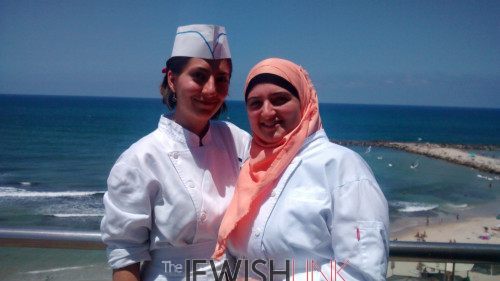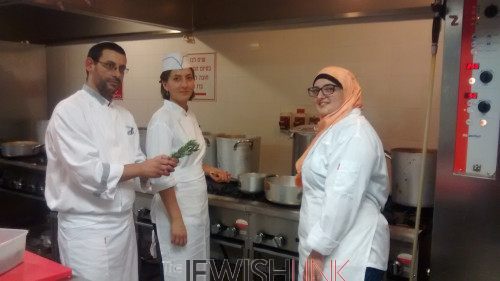
Cooking Together: Israel’s Need for Chefs Unites Culinary Students Of All Backgrounds in Special New Program
By Anav Silverman
Tazpit News Agency
When Alina Khalaman moved from Kazakhstan to Israel 18 months ago, she never imagined she would find herself learning to become a chef at Tel Aviv’s Hilton Hotel. Khalaman, a lawyer, had found her initial profession so boring that she decided to forgo a career in practicing law.
“In Kazakhstan, my father told me that I had three career options as a Jew; to be a lawyer, doctor or a musician,” said Khalaman, 25, who made aliyah with her husband.
“I came to Israel and I didn’t know what to do with myself,” Khalaman told Tazpit News Agency in an interview. “A friend told me about this chefs’ course at the Tel Aviv Hilton and that’s how it all began.”
Khalaman joined 15 other students, whose ages range from 21 to 50 – some with no cooking or baking experience at all – for the first professional culinary arts training course established by the Ministry of Economy together with Hilton Hotels Israel. With a mass demand for chefs in Israel, Hilton Hotels Israel is holding such professional courses in order to hire trained graduates for its hotel chain. It is the first such cooking program that the popular hotel brand has held anywhere in the world.
Indeed, according to statistics from the Economy Ministry, in 2013 there were 1,229 vacant cook and chef positions in Israel, and the number further increased to 1,669 in 2014. “This is a unique and new program for us,” said Motti Verses, Head of Hilton Hotels Israel Public Relations. “We are focusing on getting the right people to work for us in our hotel industry.”
Once the culinary students complete the eight-month course, which includes hours of both theory and practice, they will receive state-authorized certification from the Economy Ministry and the Hilton Hotel that will enable them to be employed. The Hilton hotel chain will hire some of the new cooks and chefs for its Hilton Tel Aviv, Waldorf Astoria Jerusalem or the Hilton Eilat Queen of Sheba and will find placements for the other graduates.
During the intensive training, which is supervised and funded by the Vocational Training Department at the Ministry of Economy, chef Oneg Etz Chaim oversees the culinary education of the new cooks. He teaches the students a wide range of subjects including menu development, food sanitation, preparing national cuisines, ethnic foods, as well as basics like names of seasonings, cookware and kitchen utensils. The students also learn baking and confection from Shlomit Abudi who has been working as a pastry chef at the Tel Aviv Hilton for 27 years.
Today Etz Chaim is satisfied with his students’ work in the kitchen. “Look at this pot of rice – it’s a success! This is the fourth pot of rice that the students have made since their hands-on-training and today they made it perfectly,” exclaims Etz Chaim.
“You have to really love this work,” notes Etz Chaim. “You have to be very dedicated – it is physically challenging to be in the heat and high temperatures of the kitchen all day, where often times you can get burned or hurt.”
“It was very difficult for me to learn how to cook in a foreign language,” comments Khalaman on her experience. “My Hebrew was awful when I first started but Oneg had so much patience with me – we used a lot hand gestures and finger-pointing to communicate.”
“I’m so happy that I discovered this for myself – I feel very comfortable with cooking today and I enjoy it with all my heart and soul,” said Khalaman, who wants to work in a restaurant once she completes the course.
Her friend and cooking partner in the course, Roaa Msarwa, from the Arab city of Tayibe in central Israel, agrees. “I started off with a blank slate – I didn’t even know how to make an omelet,” she told Tazpit.
“I come from the world of baking and pastries,” explained Msarwa, whose grandfather was a pastry chef. “But today I know how to make a great mushroom soup.”
Roaa wants to open her own coffeehouse in her home city. “It’s my dream to design a menu with great dishes,” said the ambitious 21-year-old. “This course is giving me the knowledge to do that.”
“Working in the kitchen is not like those reality cooking shows, where everything looks flashy and easy” asserts Msarwa. “It takes a lot of hard work to be a top chef or baker. There are no instant shortcuts and that’s probably the most important piece of knowledge you need in this field.”


